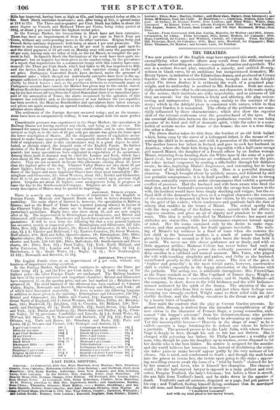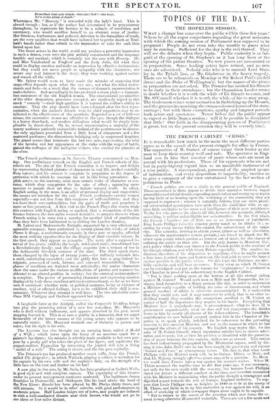THE THEATRES.
Two new products of the English stage have appeared this week, curiously exemplifying what opposite effects may result from the different nse:of similar means of exciting an audience—namely, situation and spectacle. The one is a serious five-act play, miscalled a comedy, and entitled Honesty; written in blank verse, by an ambitious but inexperienced dramatist, Mr. Henry Spicer, in imitation of the Elizabethan drama, and produced at Cove,nt Garden: the other is a serio-comic burletta, brought out at the Adelphi, called The Green Bushes; it is evidently the work of a practised play- wright, and its authorship is ascribed to Mr. Buckstcuae. Both are essen- tially melodramatic—that is, circumstance, not character, is the main-spring of the action; their incidents are alike improbable, and as pictures of life they are unreal: but the burletta is lively and affecting, the play, uninte- resting and unimpressive. This is owing mainly to the conduct of the story; which in the Adelphi piece is consistent with nature, while in that at Covent Garden it is unnatural. The efforts of the performers are mate- rially influenced by these characteristics; which also show the superior skill of the veteran craftsman over the prentice-hand of the tyro. But the essential distinction between the two productions consists in one being genuine of its kind and full of dramatic spirit, while the other is a cOUn- terfeit of certain modes and forms of the drama; the one is a true thing. the other a sham.
The Green Bushes takes its title from the burden of an old Irish ballad, which, being sung by the nurse of a kidnapped infant, is the means of me- storing the child to its mother, and with it possession of the father's estate. The mother leaves her infant in Ireland, and goes to seek her husband .in America; where she finds him living in a log-cabin with a half-caste savage girl named Miami, the daughter of a French officer by an Indian woman. Miami, returning from hunting, finds the White man in the arms of a pale- faced rival; her previous suspicions are confirmed, and, unseen by the pair, she takes instant vengeance by sending a rifle-bullet through her: faithless swain; he dies, imploring Miami's forgiveness, and entreating her to keep the secret of his infidelity from his wife. Here is a powerfid dramatic situation. Though brought about by unlikely means, and followed by, still less probable consequences, it is in itself possible; and gives rise to strong emotions, naturally expressed, under circumstances that exhibit a powerful conflict of passions. Had the husband and wife been aware who fired,the fatal shot, and her husband's connexion with the savage been known toihe wife, the incident would have been simply shocking and vulgar; but the re- fined skill of the dramatist has given to it a tragical character: the remorse of the murderess is deepened by love for her victim, by his repentance, and by the grief of his widow; whose tenderness and gratitude barb the dart of misery that rankles in the breast of Miami. The stoical apathy that veils the deep suffering of the Indian woman, accords with her efforts to suppress emotion, and gives an air of dignity and grandeur to the senti- ment. This idea is nobly embodied by Madame Celeste: her aspect and attitudes are statue-like, while her countenance expresses intense agony of mind. lIer life seems sustained only by the desire to snake repa- ration; and that accomplished, her deaths appears inevitable. The melt- ing of Miami's icy coldness in a flood of tears when she restores the lost child to the bereaved mother, is a touch of nature beautifully given by Celeste—it seemed as if her spirit burst the bonds that held it to earth. We never saw this clever performer act so finely, and with :60 little apparent artifice: Madame Celeste has never before had such an opportunity of displaying the power she evidently possesses of depicting deep emotion in a subdued and natural manner. Mrs. Yates, who played the wife with touching simplicity and pathos, and Selby as the husband, contributed greatly to the effect of the scene. The rest of the piece is "leather and primella": in the most trivial parts, however, constructive skill is visible ; especially in the happy alternation of the ludicrous with the pathetic. The acting, too, is admirable throughout: Mrs. Fitzwilliam as the Nurse reminds us of the Miss Copeland of former days; Wright as a Greenwich Showman is excessively comic; and 0. Smith, Bedford—all the company, in short, down to the wild Irishmen and the wild Indians— seemed animated by the spirit of the drama. The attention of the au- dience was kept alive from first to last ; and just when their feelings were becoming too strongly excited, Wright came to their relief with his irre- sistible drollery, and the choking sensations in the throat were got rid of by a hearty burst of laughter.
Now mark the contrast that the play at Covent Garden presents. Its absurd title, Honesty, is derived from the intended exemplification of this rare virtue in the character of Francis Gage, a young counsellor, nick- named "the beggar's advocate" from his disinterestedness; who prefers starving in a garret with his sick brother to advocating an unjust cause. Yet this incorruptible lawyer—" Honesty in the shape of man," as he is called—accepts a large retaining-fee to defend one whom he believes a parricide. The accused proves to be the Lady Julia, with whom Francis Gage is deeply in love, though his suit to her has not thriven. She is charged with poisoning her father, Sir Philip Lancaster ; a wealthy Old man, who, though he puts his daughter up to auction, seems disposed to let her decide who is the best bidder. No motive is assigned for the murder, and the world believes her innocent; but, instead of disclaiming the crime, she takes pains to make herself appear guilty by the very manner of her silence. She is tried, and condemned to death ; and though the mob break into the prison to rescue her, she insists upon going to the stake ; appear- ing unwilling even to await the issue of a "trial by battle" claimed for her by her counsel and lover, who is himself her champion. Her,chanee is small ; for the half-starved lawyer is opposed to a lusty gallant and rival suitor, Douglas Trafford, the lady's kinsman: but before a blow is struak, the axe falls from Trafford's hand, and he sinks down in the 'agonies of death. Trafford's cast-off mistress disguised as a page,,had put-poisoniin his cup ; and Trafford, finding himself dying, confesites that ha :plunked the,old man, and hound the daughter to secrecy— "1 murdered Lancaster)
And with my steel glued to her enowy breast, ;Prescribed that oath which—wretched tool !—she kept, Ev'n to the grasp of death."
Whereupon Mr. " Honesty " is rewarded with the lady's hand. This is absurd enough ; but, as if the author had determined to be preposterous throughout, he represents his heroine to be a miracle of resolution and constancy, who would sacrifice herself to an abstract sense of justice. Her firmness, fearlessness, and pedantic devotion to the formalities of truth, are the very qualities that would have induced her to prefer death at Tea!- ford's hands rather than submit to the imputation or take the oath thus forced upon her.
The finest actors in the world could not produce a powerful impression in such a drama, even were the plot artfully constructed and the language forcible and poetical; which is certainly not the case with Honesty. Mr. and Miss Vandenhoff as Trafford and the Lady Julia, did what they could to display emotion and make an impression by effective declamation: but they could not move people to sympathy with the characters, nor create any real interest in the story; they were working against nature and reason all the while.
-Mr. Spicer would seem to have made the mistake of supposing that stage-effect depends upon what the eye sees, not what the mind under- stands and feels—in a word, that the essence of dramatic representation is snake-believe. And accordingly he has produced a sham play—a humour- less caricature of the old English drama. The conventional peculiarities of the elder dramatists, grossness excepted, are studiously copied in this mock "comedy "—their high qualities it is beyond the author's ability to emulate. That the play should have been tolerated after the first repre- sentation, when the author's friends were its chief supporters, may be at- tributed to the effectiveness of the spectacle. Regarded as a set of tableaux vivans, the successive scenes arc effective to the eye; though the dialogue is a heavy drawback, and renders ridiculous what would be simply inex- plicable in dumb-show. On its second representation a majority of the scanty audience patiently endured the tedium of the performance in silence: the only applause proceeded from a little knot of clacqueurs and a few scattered partisans; the dissentients indulging only in suppressed laughter. The grand scenes that terminate the last two acts, representing the trial of the heroine and her appearance at the stake with the wager of battle, gained-the suffrages of the half-price visiters, who swelled the plaudits at the elem.



























 Previous page
Previous page